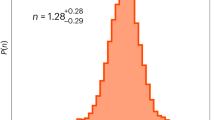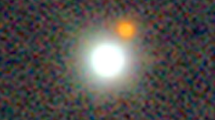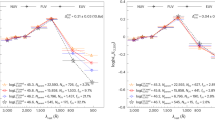Abstract
QUASARS have long been known to vary in magnitude1, and it now appears that all quasars are to some extent variable2. In a few extreme cases, quasar luminosities have varied over several magnitudes on a timescale of months; this behaviour is normally accompanied by other phenomena (such as radio emission or enhanced polarization) indicative of processes intrinsic to the quasars. Long-term luminosity variations, while less dramatic, are much more common, but their origin remains poorly understood. Here I investigate this longer-term behaviour for a sample of approximately 300 quasars at redshifts ranging from 1 to 3, whose optical magnitudes have been measured periodically for 17 years. I show that there is a positive correlation between the timescale of variability and the average luminosity, but little evidence for an increase in timescale due to redshift (and hence time dilation). These findings are inconsistent with any known variability mechanism intrinsic to quasars, but can be explained by gravitational lensing of the quasar images by compact substellar objects along the lines of sight. If this interpretation is correct, the population of lensing objects must have a density of at least 0.1 of the critical cosmological density.
This is a preview of subscription content, access via your institution
Access options
Subscribe to this journal
Receive 51 print issues and online access
$199.00 per year
only $3.90 per issue
Buy this article
- Purchase on Springer Link
- Instant access to full article PDF
Prices may be subject to local taxes which are calculated during checkout
Similar content being viewed by others
References
Penston, M. V. & Cannon, R. D. Bulletin No. 159 (Royal Observatory, Edinburgh, 1970).
Hawkins, M. R. S. & Veron, P. Mon. Not. R. astr. Soc. 260, 202–208 (1993).
Hawkins, M. R. S. Mon. Not. R. astr. Soc. 202, 571–585 (1983).
Hawkins, M. R. S. Mon. Not. R. astr. Soc. 219, 417–426 (1986).
Hook, I. M., McMahon, R. G., Boyle, B. J. & Irwin, M. J. in The Space Distribution of Quasars ASP Conf. Ser. Vol. 21 (ed. Crampton, D.) 55 (Astronomical Society of the Pacific, San Francisco, 1991).
Reees, M. J. A. Rev. Astr. Astrophys. 22, 471–506 (1984).
Peacock, J. A. Mon. Not. R. astr. Soc. 223, 113–128 (1986).
Kayser, R., Refsdal, S. & Stabell, R. Astr. Astrophys. 166, 36–52 (1986).
Schneider, P. & Weiss, A. Astr. Astrophys. 171, 49–65 (1987).
Refsdal, S. & Stabell, R. Astr. Astrophys. 250, 62–66 (1991).
Blandford, R. D. & Narayan, R. A. Rev. Astr. Astrophys. 30, 311–358 (1992).
Press, W. H. & Gunn, J. E. Astrophys. J. 185, 397–412 (1973).
Canizares, C. R. Astrophys. J. 263, 508–517 (1982).
Lewis, G. F., Miralda-Escudé, J., Richardson, D. C. & Wambsganss, J. Mon. Not. R. astr. Soc. 261, 647–656 (1993).
Author information
Authors and Affiliations
Rights and permissions
About this article
Cite this article
Hawkins, M. Gravitational microlensing, quasar variability and missing matter. Nature 366, 242–245 (1993). https://doi.org/10.1038/366242a0
Received:
Accepted:
Issue Date:
DOI: https://doi.org/10.1038/366242a0
This article is cited by
-
The deviation of optical variability of radio-quiet quasars from damped random walk
Astrophysics and Space Science (2019)
-
Modeling the spatial distribution of neutron stars in the Galaxy
Astrophysics and Space Science (2012)
-
The spatial distribution of old neutron stars in the Galaxy
Science China Physics, Mechanics and Astronomy (2010)
Comments
By submitting a comment you agree to abide by our Terms and Community Guidelines. If you find something abusive or that does not comply with our terms or guidelines please flag it as inappropriate.



